Jonathan Munby's production starring Ian McKellen, first seen last year in Chichester and now transferred to the West End, reflects our everyday anxieties, emphasising in the world of a Trump presidency, the dangers of childish, petulant authoritarianism. And while King James I was keen to promulgate the benefits of a united kingdom - having joined England and Scotland under his rule only three years before Shakespeare's tragedy was presented at court in 1606 - the corrosive nature of divisions within the state is equally clear now in the era of Brexit. The Union Flag features frequently in Paul Wills' design.
Munby is an inspiring director, especially of Shakespeare, mining text and motivation with meticulous care. His Globe productions of Antony and Cleopatra and The Merchant of Venice were especially revealing. Here, in a modern-dress setting, he makes much of the pagan nature of Lear as well as contemporary concerns. This places the action - clear and fast-paced though it is - in a strange world where people in combat gear pay deference to "the gods", showing respect for Apollo with ritualised hand gestures.
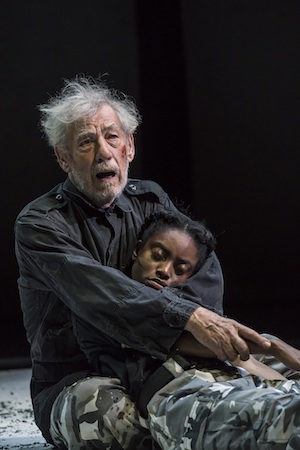 If there are more ideas than the production's frame can easily contain, at its heart is Ian McKellen's mesmerising performance, exploring the vulnerability of old age, the absoluteness of death, the fragility of life and of sanity with such humanity, such a mixture of twinkling mischief, unforgivable cruelty, gentleness and sad acceptance of his failings that it takes your breath away. Much was made last year of the importance of the intimacy of the Minerva Theatre, which seats fewer than 300 people, but McKellen's performance remains unforced, even conversational, in its new surroundings. This is aided by the design, which includes a central walkway through the audience and a panelled wooden curve often limiting the stage area.
If there are more ideas than the production's frame can easily contain, at its heart is Ian McKellen's mesmerising performance, exploring the vulnerability of old age, the absoluteness of death, the fragility of life and of sanity with such humanity, such a mixture of twinkling mischief, unforgivable cruelty, gentleness and sad acceptance of his failings that it takes your breath away. Much was made last year of the importance of the intimacy of the Minerva Theatre, which seats fewer than 300 people, but McKellen's performance remains unforced, even conversational, in its new surroundings. This is aided by the design, which includes a central walkway through the audience and a panelled wooden curve often limiting the stage area.
To begin with, Lear appears alone for a moment, enjoying the stage-managed surprise he is about to spring. His daughters sweep in dressed in ball gowns and the court sing together. All seems well-ordered, even good-natured, until the fateful fracturing of the kingdom. Sinéad Cusack plays good-hearted Kent, banished for speaking up and soon disguised as an Irish-accented male servant to the king in his homeless wanderings. The gender change makes perfect sense (as a similar casting, of Saskia Reeves did in Nancy Meckler's Globe production last year) and Cusack carries it off brilliantly.
Of the daughters, Anita-Joy Uwajeh as a strong-minded Cordelia and Claire Price as a Sloaney, pearls-and-headscarf, Goneril are new to the cast. Kirsty Bushell's fascinating Regan is unstable, kittenish, manipulative, sexually excited by the blinding of Gloucester. This is especially horrific, carried out with a meat hook in an abattoir. The heads of the dumb beasts - cow and pig - have already witnessed Lear's mock arraignment of his daughters.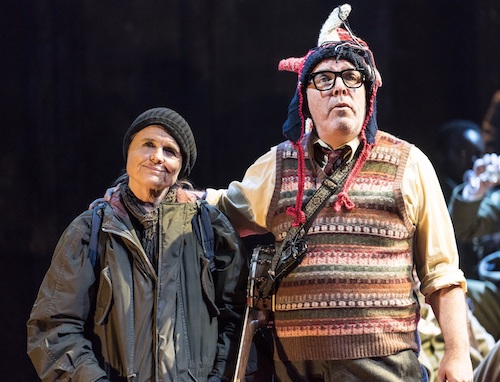 Lloyd Hutchinson's Irish Fool (above with Sinéad Cusack as Kent) plays the banjo and cheekily mimics his master - rather well. His witnessing of Gloucester's blinding and subsequent encounter with a murderous Edmund seem odd additions, however.
Lloyd Hutchinson's Irish Fool (above with Sinéad Cusack as Kent) plays the banjo and cheekily mimics his master - rather well. His witnessing of Gloucester's blinding and subsequent encounter with a murderous Edmund seem odd additions, however.
Danny Webb's Gloucester is a fine foil for McKellen and their Dover scene very moving as two old men, in the wisdom and foolishness of age, learn the error of their ways while facing mortality, one blind, the other madly wielding a bunch of weeds like a gun. Luke Thompson visibly grows up as Edgar and James Corrigan makes a clever, sardonic Edmund. But, however good the rest of the cast, it is McKellen who is unforgettable. His career has encompassed many of Shakespeare's major roles, including Edgar, Kent and, in Trevor Nunn's operatic 2007 RSC production, an earlier Lear. If, at 78, this really is his last stage performance in Shakespeare, it makes a stunning finale.
@heathermneill
Overleaf: more great Lears

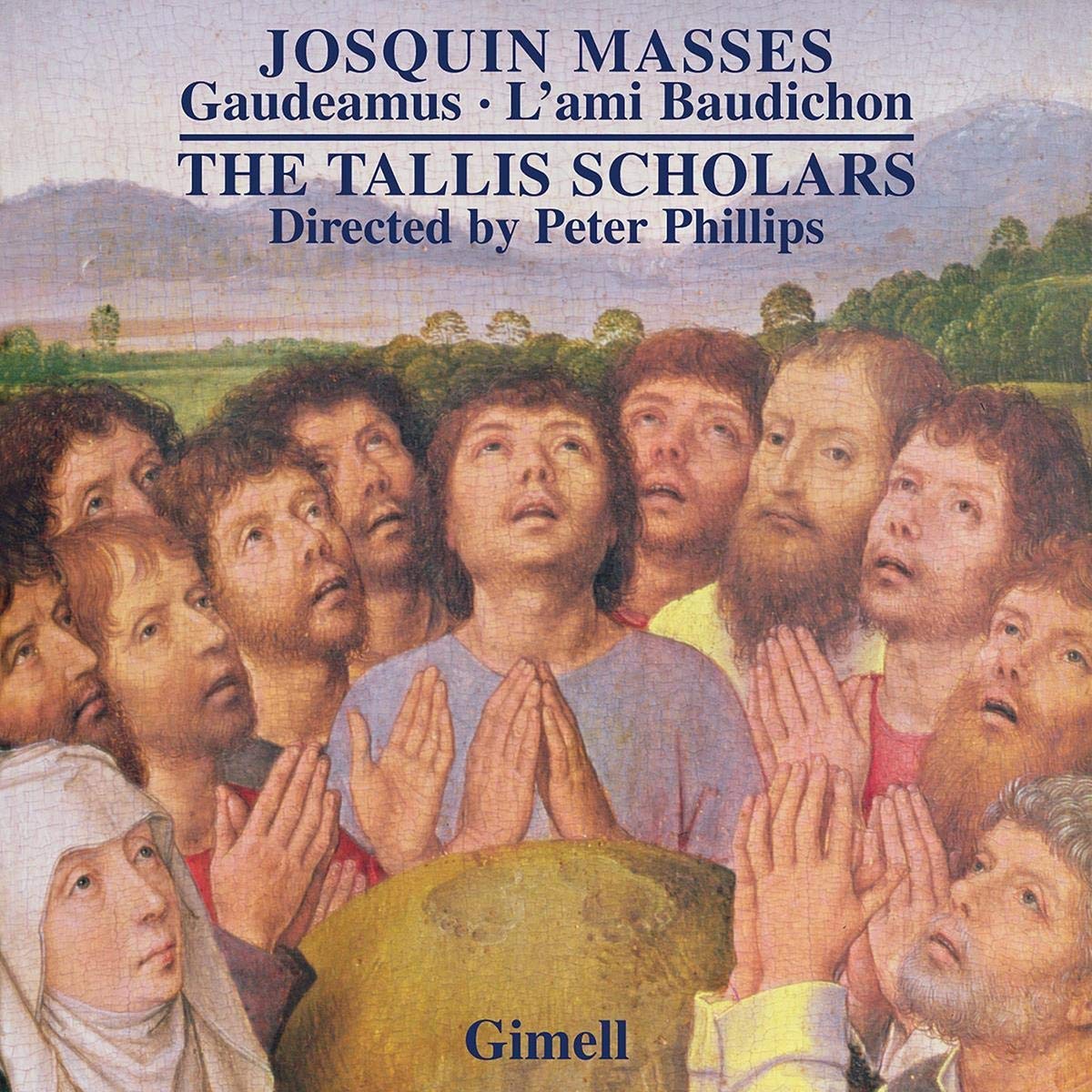 Josquin: Missa Gaudeamus, Missa L’ami Baudichon The Tallis Scholars/Peter Phillips (Gimell)
Josquin: Missa Gaudeamus, Missa L’ami Baudichon The Tallis Scholars/Peter Phillips (Gimell)
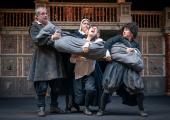

 Louis Couperin: Dances from the Bauyn Manuscript Pavel Kolesnikov (Hyperion)
Louis Couperin: Dances from the Bauyn Manuscript Pavel Kolesnikov (Hyperion)
 If there are more ideas than the production's frame can easily contain, at its heart is Ian McKellen's mesmerising performance, exploring the vulnerability of old age, the absoluteness of death, the fragility of life and of sanity with such humanity, such a mixture of twinkling mischief, unforgivable cruelty, gentleness and sad acceptance of his failings that it takes your breath away. Much was made last year of the importance of the intimacy of the Minerva Theatre, which seats fewer than 300 people, but McKellen's performance remains unforced, even conversational, in its new surroundings. This is aided by the design, which includes a central walkway through the audience and a panelled wooden curve often limiting the stage area.
If there are more ideas than the production's frame can easily contain, at its heart is Ian McKellen's mesmerising performance, exploring the vulnerability of old age, the absoluteness of death, the fragility of life and of sanity with such humanity, such a mixture of twinkling mischief, unforgivable cruelty, gentleness and sad acceptance of his failings that it takes your breath away. Much was made last year of the importance of the intimacy of the Minerva Theatre, which seats fewer than 300 people, but McKellen's performance remains unforced, even conversational, in its new surroundings. This is aided by the design, which includes a central walkway through the audience and a panelled wooden curve often limiting the stage area. Lloyd Hutchinson's Irish Fool (above with Sinéad Cusack as Kent) plays the banjo and cheekily mimics his master - rather well. His witnessing of Gloucester's blinding and subsequent encounter with a murderous Edmund seem odd additions, however.
Lloyd Hutchinson's Irish Fool (above with Sinéad Cusack as Kent) plays the banjo and cheekily mimics his master - rather well. His witnessing of Gloucester's blinding and subsequent encounter with a murderous Edmund seem odd additions, however.

 Streya: New works for solo violin and violin with electronics Olivia De Prato (violin) (New Focus Recordings)
Streya: New works for solo violin and violin with electronics Olivia De Prato (violin) (New Focus Recordings)

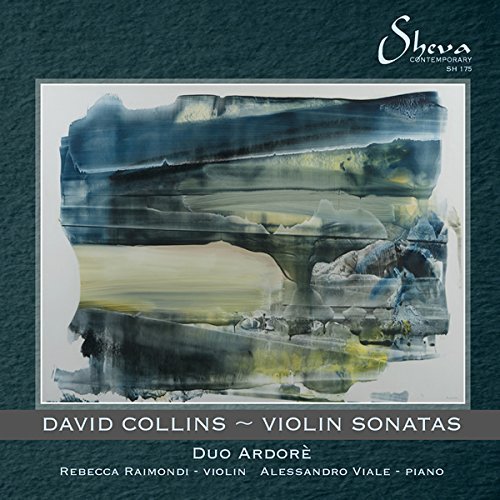 David Collins: Violin Sonatas Duo Ardoré (Sheva)
David Collins: Violin Sonatas Duo Ardoré (Sheva)